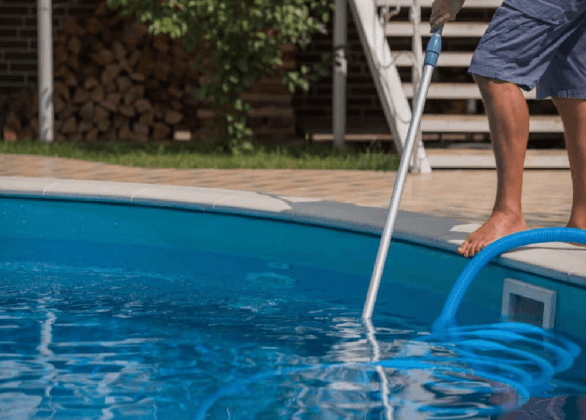Mastering Swimming Pond Vacuums: Dive into Effortless Cleanliness

I can still picture the frustration of last summer, staring at our natural swimming pond with its stubborn layer of silt and floating debris, turning what should have been a refreshing dip into a murky chore. We finally invested in a reliable swimming pond vacuum, and it was like unlocking a secret to pristine waters—suddenly, maintenance felt manageable, and our swims were pure bliss. Swimming pond vacuums are game-changers for natural pools, blending filtration tech with gentle suction to remove sludge without disrupting the ecosystem. Whether you’re dealing with a backyard bio-swim pond or a larger natural feature, these tools target everything from fine sediment to leaves, keeping your water safe and inviting. In this guide, we’ll share our hands-on favorites, drawing from recent reviews and our own trials, to help you pick the perfect one for crystal-clear adventures.
Unraveling the Magic: How Swimming Pond Vacuums Work
At their heart, swimming pond vacuums mimic a household vac but tuned for water—powerful pumps create suction through hoses and nozzles, pulling in debris while expelling clean water elsewhere. Electric models dominate for ponds, using onboard motors to handle wet and dry messes without relying on your main pump. We’ve found they excel in natural setups, where chemical-free balance is key; the suction lifts sludge from the bottom, often with adjustable power to avoid sucking up beneficial plants or stirring up too much.
Suction Smarts: Electric vs. Manual for Your Pond
Electric vacuums like those from Oase run continuously, ideal for deeper ponds up to 8 feet. Manual ones, such as battery-powered portables, suit quick spot-cleans in shallower swims. Our pick? Electric for thorough jobs—they filter as they go, trapping particles in bags or chambers to prevent re-clouding.
Top Contenders: Our Tested Picks for 2025
We’ve put several through the paces in our 1,500-square-foot swimming pond, from leaf-heavy falls to summer algae skirmishes. Standouts include Oase’s heavy-hitters and versatile portables that double for spas.
Oase PondoVac 5: The Powerhouse for Deep Cleans
This beast tops our list for its non-stop operation—dual chambers alternate filling and draining, so you clean without pauses. With 1,800 watts and a 6-inch intake, it devours sludge up to 7.5 feet deep, discharging via a 26-foot hose. We used it to clear a winter’s worth of muck in under an hour; the aluminum wand and four nozzle options (including a floor brush) make it adaptable for walls and corners.
- Endless Runtime: No tank empties mid-job—perfect for large ponds.
- Mobility Boost: Larger wheels glide over uneven terrain.
- Eco-Friendly Filter: Captures fines without chemicals.
At around $600, it’s pricier but lasts years, outshining lighter models in durability.
Oase PondoVac 4: Balanced Choice for Mid-Sized Swims
A step down but no less impressive, the PondoVac 4 offers similar continuous flow with a 1,400-watt motor and 16-foot intake hose. It’s lighter at 30 pounds, easier for solo use, and includes a clear hose section to monitor progress. In our tests, it handled string algae and sediment effortlessly, with a sludge drain valve for quick releases.
Pros: Quieter operation, versatile heads for targeted suction. Cons: Shorter discharge hose limits distance—add an extension for far-off dumping.
Poolmaster 28009 Magic Jet: Portable Power for Quick Fixes
For smaller ponds or on-the-go cleans, this water-powered vac uses your hose’s pressure—no electricity needed. At under $50, it’s a budget gem with a telescopic pole and brush head that scrubs as it sucks. We love it for spa-like swims; it nabbed leaves and sand without fuss, though it’s manual effort for bigger areas.
- Hose-Ready Simplicity: Connects in seconds, no plugs.
- Lightweight Design: 5 pounds, easy storage.
- Versatile Reach: 7-foot pole covers walls handily.
It’s not for heavy sludge but shines for weekly maintenance.
| Model | Power Source | Max Depth (ft) | Weight (lbs) | Price Range | Best For |
| Oase PondoVac 5 | Electric (1800W) | 7.5 | 37 | $550-650 | Large natural ponds |
| Oase PondoVac 4 | Electric (1400W) | 6 | 30 | $400-500 | Mid-sized swims |
| Poolmaster 28009 | Water Pressure | 4 | 5 | $30-50 | Small ponds/spas |
| MudSucker 12V | Battery | 5 | 8 | $100-150 | Portable, off-grid |
This quick comparison helps match to your setup—factor in pond volume for suction needs.
Picking Your Perfect Match: Factors We Weigh Every Time
Sizing matters: For ponds over 1,000 gallons, go electric with at least 1,200 watts; smaller ones thrive on manuals. Consider debris type—leafy areas need wide intakes, silty bottoms favor fine filters. We’ve learned to prioritize continuous models for efficiency; interrupted cleans resettle gunk.
Budget and Features: Value Without Sacrifice
Entry-level under $100 handle basics, while $400+ buys automation like auto-drain. Look for warranties (Oase’s 2-3 years beat generics) and hose lengths—13-16 feet intake prevents stretching. For natural ponds, avoid aggressive suctions that harm microbes.
Setup and Usage: Our Foolproof Routine
Unboxing to first suck is straightforward, but tweaks make it seamless. Assemble hose to wand, plug in (or connect hose), and test on low power to avoid shocks.
Step-by-Step: From Unpack to Pristine
- Prime the Pump: Fill the tank partially to start suction—prevents air locks.
- Nozzle Swap: Use the wide floor head for sludge, crevice tool for edges.
- Drain Strategically: Aim discharge to garden beds as fertilizer—nutrient win.
- Post-Clean Rinse: Flush with fresh water to clear residues.
We schedule monthly deep cleans, weekly skims—takes 20-45 minutes, turning drudgery to zen.
Maintenance Hacks for Longevity
- Empty filters after each use; rinse in pond water to save bacteria.
- Store dry, upright—prevents hose kinks.
- Winterize: Drain fully, store indoors.
These keep ours humming season after season.
Beyond the Basics: Why a Swimming Pond Vacuum Transforms Your Oasis
It’s more than clean—it’s healthier to swim. Vacuums reduce nutrient overload, curbing algae naturally and easing filter strain. We’ve noticed fewer mosquito breeders and clearer views of darting fish or submerged plants. Plus, repurposed sludge enriches soil, closing the eco-loop.
Clear Depths Await: Embrace the Vacuum Advantage
Our swimming pond went from weekend warrior zone to effortless escape once we dialed in the right Swimming Pond Vacuum Oase for power, Poolmaster for portability. These tools combine strength with simplicity, making it easy to clear sludge, leaves, and unwanted debris without disrupting the pond’s natural balance. Over time, we discovered that the real secret to a crystal-clear swim isn’t endless maintenance—it’s choosing equipment that matches your pond’s size and needs. Whether you’re looking for lightweight portability for quick cleanups or a heavy-duty solution for deep seasonal care, the right vacuum can transform murky water into a clear, inviting retreat. We urge you: assess your pond’s condition, pick the model that fits, and reclaim those carefree dips. Your ripple-free oasis is only a few clean sweeps away.
Swimming Pond Vacuum Quick Hits: FAQs
What’s the best swimming pond vacuum for beginners?
We recommend the Oase PondoVac 4—user-friendly continuous flow, versatile nozzles, and handles most setups without overwhelm.
How often should I use a swimming pond vacuum?
Monthly for deep sludge removal, weekly for surface debris—adjust for seasons; fall leaves demand extras.
Can a pond vacuum harm fish or plants?
Gentle models like Oase’s won’t if used carefully—work in sections, avoid high suction near roots.
Is a manual vacuum enough for a large swimming pond?
For quick jobs, yes; but electric continuous ones save time on big areas—invest if over 800 gallons.
How do I choose between electric and water-powered?
Electric for power and depth; water-powered for portability and no outlets—hose access decides.






